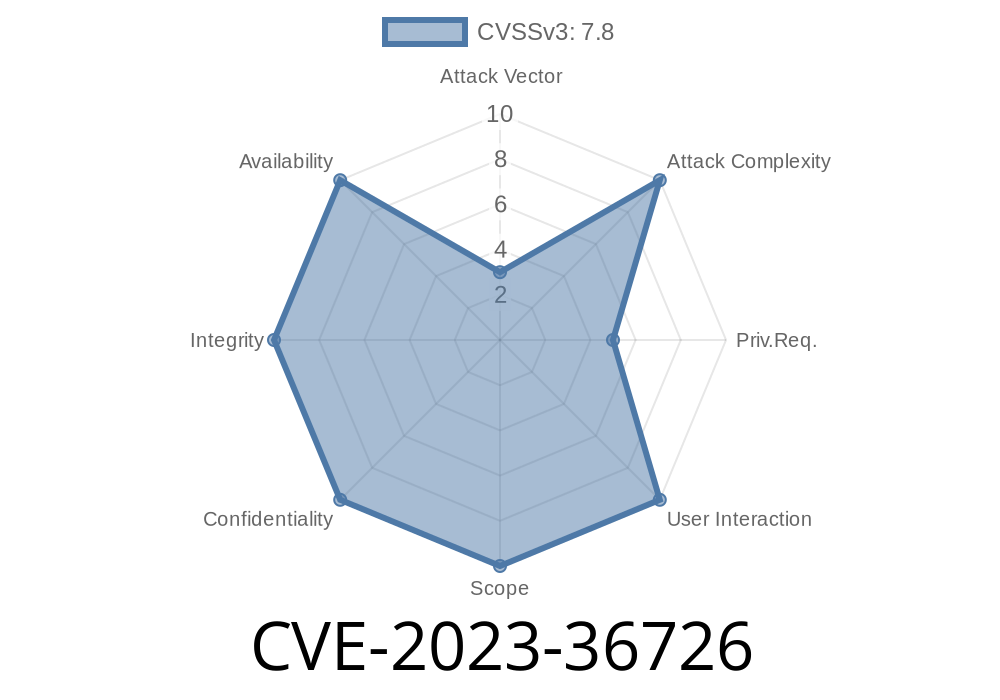Microsoft's security bulletins often look daunting, but underneath the technical language are critical issues that can affect millions of Windows machines worldwide. One recent vulnerability, CVE-2023-36726, is significant because it allows attackers to elevate their privileges on a system using a flaw in Windows' Internet Key Exchange (IKE) extensions. This post will break down the vulnerability, how it can be exploited, and what you should do to stay safe.
What is IKE and Why Does it Matter?
Internet Key Exchange (IKE) is a foundational part of how Windows sets up secure VPN tunnels using IPsec. It negotiates and manages encryption keys for secure communication. Because the process runs with high privileges, any mistake in the IKE handling code can be especially dangerous.
What is CVE-2023-36726?
CVE-2023-36726 describes a Windows vulnerability in the IKE extension that makes it possible for an attacker to _elevate their privileges_. This means an attacker with limited access (like a regular user) can gain administrator-level control.
Official Microsoft description:
> An elevation of privilege vulnerability exists in the Windows Internet Key Exchange (IKE) extension. An attacker who successfully exploited this vulnerability could gain SYSTEM privileges.
> Microsoft Security Update Guide
Windows Server 2016, 2019, 2022
If your organization uses VPNs or allows remote access, you're more likely to be exposed.
How Does the Attack Work?
While the detailed technical exploit is kept quiet by Microsoft for security, general information and patterns can be explained.
Attacker sends specially crafted data to the IKEEXT service on the local machine.
3. Vulnerable code handles this data poorly, causing a _privilege escalation_ (e.g., buffer overflow, improper permissions).
Sample Exploit Code Concept
Disclaimer: This is a safe, high-level concept meant for education, not actual attack use.
Suppose there's a vulnerability in how IKEEXT handles incoming VPN messages. An example in Python (not the actual exploit):
import socket
# Connect to the local IKEEXT service (usually uses UDP port 500)
sock = socket.socket(socket.AF_INET, socket.SOCK_DGRAM)
target = ('127...1', 500)
# Hypothetical malicious payload to trigger buffer overflow or bug.
payload = b'\x90' * 1024 # Oversized input
# Send payload - if IKEEXT is vulnerable, this could trigger privilege escalation
sock.sendto(payload, target)
sock.close()
In reality, the exploit would be much more complex and require understanding the protocol's structure and the vulnerable code.
Real-World Usage & Exploit Detail
- No authentication required: If the attacker is already running code as a regular user, they do _not_ need special privileges.
- Local only: This vulnerability cannot be exploited remotely unless the attacker first gains access to the machine.
Successful exploitation: Leads to _SYSTEM_ privileges, which means full control.
Security firm Zero Day Initiative shares some insight (ZDI-23-1205) suggesting the vulnerability was responsibly reported and patched by Microsoft.
Apply Windows updates immediately
Restrict who can log on to critical servers.
3. Use antivirus/endpoint detection:
Conclusion
CVE-2023-36726 is a textbook example of how overlooked VPN and cryptography services can endanger entire organizations. If attackers gain local access to a machine, this bug offers a fast-track to SYSTEM powers. Thankfully, the fix is simple: update your Windows machines regularly.
For more details
- Microsoft Security Update Guide - CVE-2023-36726
- Zero Day Initiative Advisory ZDI-23-1205
Timeline
Published on: 10/10/2023 18:15:16 UTC
Last modified on: 10/13/2023 19:58:57 UTC
